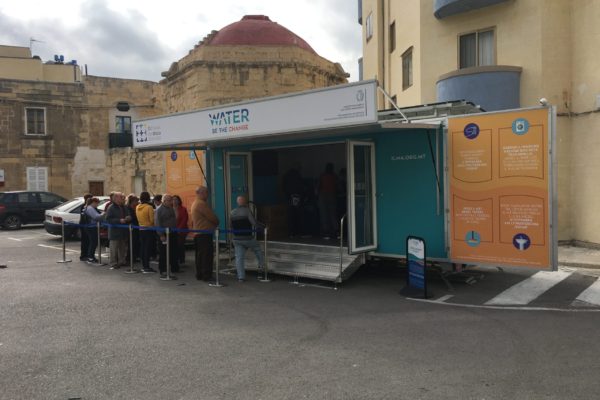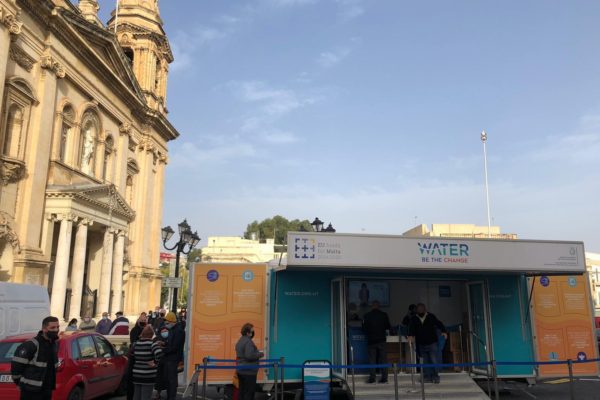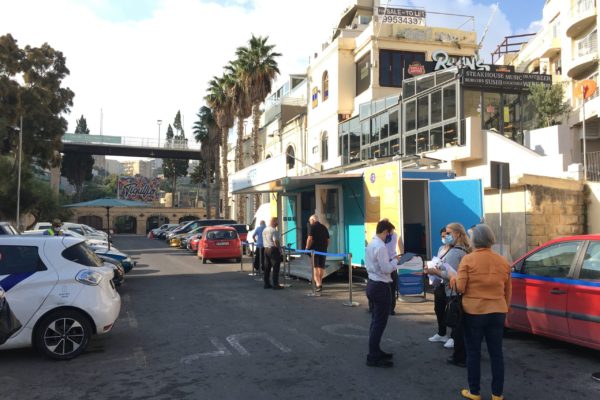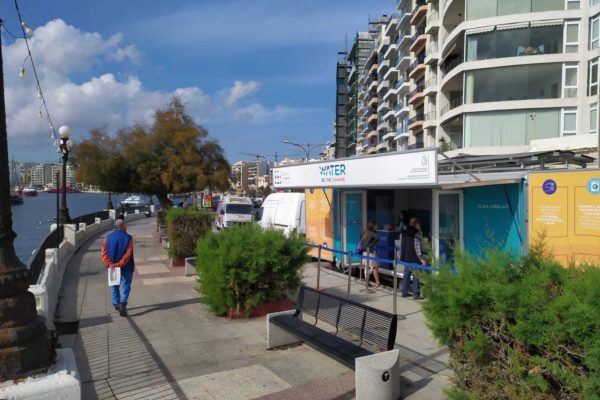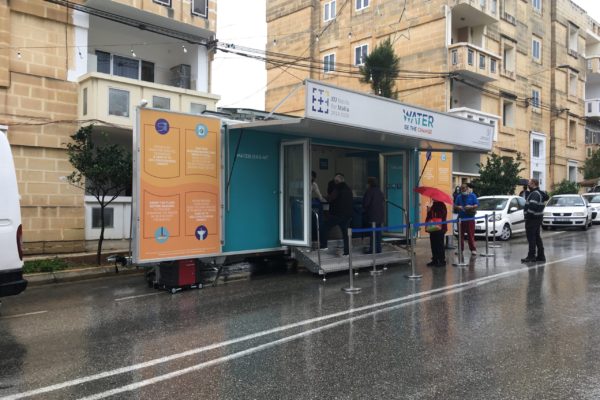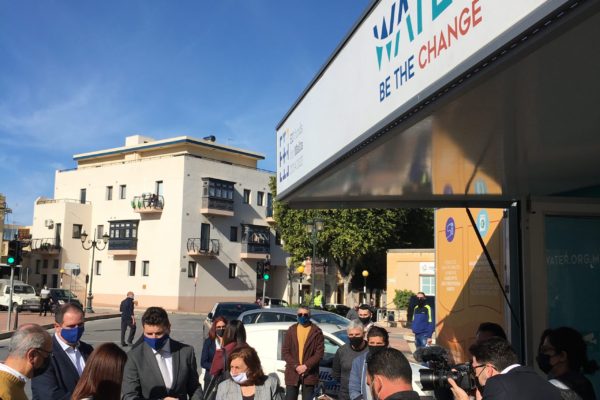The
WATER – BE THE CHANGE is a national water conservation campaign launched in September 2019 with the aim of delivering an effective educational and awareness raising campaign on the optimised and efficient use of water resources to facilitate a cultural shift in people’s behaviour towards water conservation on the Maltese Islands.
The campaign will run for a period of 3 years targeting the domestic, commercial and agricultural sectors.
Context
THE BIGGEST CHALLENGE IN THE MALTESE WATER SECTOR, is the scarcity of natural freshwater, as evidenced by the fact that Malta has the lowest natural freshwater availability per capita of all the European Union (EU) Member States.
Meaning that according to the United Nations (UN) Falkenmark Index for water scarcity, Malta classifies as having natural freshwater resources which are below the manageable capability for the country’s sustainable development. This situation arises due to Malta’s high population density, which at about 1,325 people per square kilometre, makes Malta by far the most densely populated EU Member State. Moreover, the Maltese population is expected to grow annually by 0.43% until 2030 (2nd Water Catchment Management Plan, 2015). This, together with the increasing number of tourists visiting the Maltese Islands, and the arid Mediterranean climate, poses a serious pressure on the local water resource.
Several sectors rely on the water resource, the main ones being the domestic, agricultural and commercial sectors.
The demand for water resources is currently addressed through four different sources: abstraction of groundwater; harvesting of rainwater runoff; desalination of seawater using reverse osmosis; and the treatment of wastewater. Groundwater abstraction is the dominant water supply resource in the Maltese Islands.
The strong reliance on groundwater abstraction has resulted in abstraction rates higher than the amount of water from rainfall which recharges Malta’s main aquifer (the mean sea level aquifer), which results in seawater intrusion.
Against this background, the importance of awareness of the current state of affairs in the local water sector, and the dissemination of such information to all stakeholders, should be emphasised. In view of the increasing demand, and the resulting competition between the various sectors for the limited water resource, awareness of the current situation is of paramount importance for ensuring good governance and optimising the management of water resources.
Context
THE BIGGEST CHALLENGE IN THE MALTESE WATER SECTOR, is the scarcity of natural freshwater, as evidenced by the fact that Malta has the lowest natural freshwater availability per capita of all the European Union (EU) Member States.
Meaning that according to the United Nations (UN) Falkenmark Index for water scarcity, Malta classifies as having natural freshwater resources which are below the manageable capability for the country’s sustainable development. This situation arises due to Malta’s high population density, which at about 1,325 people per square kilometre, makes Malta by far the most densely populated EU Member State. Moreover, the Maltese population is expected to grow annually by 0.43% until 2030 (2nd Water Catchment Management Plan, 2015). This, together with the increasing number of tourists visiting the Maltese Islands, and the arid Mediterranean climate, poses a serious pressure on the local water resource.
Several sectors rely on the water resource, the main ones being the domestic, agricultural and commercial sectors.
The demand for water resources is currently addressed through four different sources: abstraction of groundwater; harvesting of rainwater runoff; desalination of seawater using reverse osmosis; and the treatment of wastewater. Groundwater abstraction is the dominant water supply resource in the Maltese Islands.
The strong reliance on groundwater abstraction has resulted in abstraction rates higher than the amount of water from rainfall which recharges Malta’s main aquifer (the mean sea level aquifer), which results in seawater intrusion.
Against this background, the importance of awareness of the current state of affairs in the local water sector, and the dissemination of such information to all stakeholders, should be emphasised. In view of the increasing demand, and the resulting competition between the various sectors for the limited water resource, awareness of the current situation is of paramount importance for ensuring good governance and optimising the management of water resources.
Who’s
behind it?
This project is part-funded by the European Union under the Cohesion Fund – European Structural and Investment Funds 2014-2020. This campaign is being implemented by the Energy and Water Agency – a Government Agency established within the Ministry for Energy and Water Management. Set up in 2014, the Agency is tasked with formulating and implementing Government’s national policies in the energy and water sectors, aimed at ensuring security, sustainability and affordability of energy and water in Malta.
Gallery
Our
Testimonials
Live
Feed
Live Feed

Renny Desira
Renny's Herbs and Salads
Renny has invested in a hydroponic farm to grow his crops and flowers.
“Switching to a hydroponic system was a very advantageous and ideal decision for me since my land is not very large. The technology allows me to grow a considerable amount of crops even in a restricted space.
Since I started using the hydroponic system, I eliminated the need of crop rotation and maximised the use of water through the continuous cycle. By investing in this system I benefited from a substantial monetary gain on reduced water consumption.”
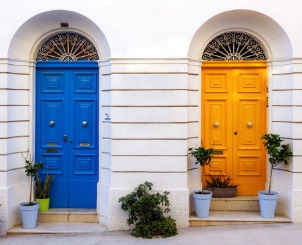
Louis Mifsud,
A resident from San Ġwann
“We moved into our house 30 years ago and soon after I realised I could use the little well we have in our yard to save water. So I decided to make use of the rain water, by capturing it in the well instead of letting it run off. We connected a pump to the well and everyday when the well is full, especially in the colder months of the year, I switch the pump on and use the well for toilet flushing. In seasons with less rain, I use my well to water my plants, instead of using tap water. I have found these solutions easy to implement and maintain and have helped me save water all these years.”
Ivan Borg
I would like to thank the ‘Water – Be the Change’ campaign for their help and assistance throughout this project. Thanks to the interventions carried out within my fields, I can make use of water in a more efficient and conscious manner, saving water that was previously lost to excess.
These interventions also help me to save electricity, using harvested cleaner water, rather than pumping up water from the borehole.
Connect
with us
Follow our channel to see all our videos, learn more about Water and how you can be the change. Find out what we’ve been up to, subscribe to our channel for updates.
Connect
with us
Follow our channel to see all our videos, learn more about Water and how you can be the change. Find out what we’ve been up to, subscribe to our channel for updates.
